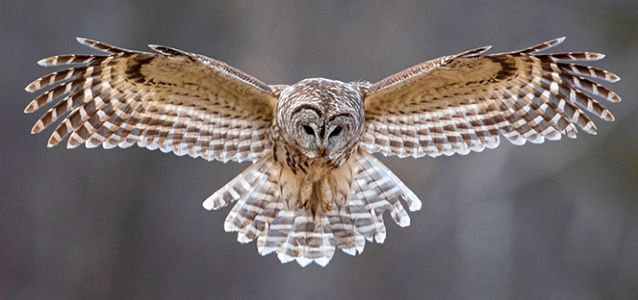||| FROM PBS.ORG |||
To save the imperiled spotted owl from potential extinction, U.S. wildlife officials are embracing a contentious plan to deploy trained shooters into dense West Coast forests to kill almost a half-million barred owls that are crowding out their smaller cousins.
The U.S. Fish and Wildlife Service on Wednesday was expected to release its final plan to prop up declining spotted owl populations in Oregon, Washington state and California. The Associated Press obtained details in advance.
The plan calls for killing up to 470,000 barred owls over three decades after the birds from the eastern U.S. encroached into the territory of two West Coast owls: northern spotted owls and California spotted owls. The smaller spotted owls have been unable to compete for food and habitat with the invaders.
Past efforts to save spotted owls focused on protecting the forests where they live. But the proliferation of barred owls in recent years is undermining that earlier work, officials said.
“We’re at a crossroads. We have the science that indicates what we need to do to conserve the spotted owls, and that requires that we take action on the barred owls,” said Bridget Moran, a deputy state supervisor for the Fish and Wildlife Service in Oregon.
The notion of killing one bird species to save another has divided wildlife advocates and conservationists. Some grudgingly accepted the proposal after a draft version was announced last year; others denounced it as reckless and a diversion from needed forest preservation.
Barred owls already are being killed in spotted owl habitats for research purposes, with about 4,500 removed since 2009, said Robin Bown, barred owl strategy leader for the Fish and Wildlife Service. Those targeted included barred owls in California’s Sierra Nevada region, where the animals have only recently arrived and officials want to stop populations from taking hold.
In other areas where barred owls are more established, officials aim to reduce their numbers but acknowledge shooting owls is unlikely to eliminate them entirely.
**If you are reading theOrcasonian for free, thank your fellow islanders. If you would like to support theOrcasonian CLICK HERE to set your modestly-priced, voluntary subscription. Otherwise, no worries; we’re happy to share with you.**









This is a horrific situation created by the rampant destruction of old growth forests and other wildlife habitat.
It’s much easier–and, to economists, more desirable–for the USFWS to kill hundreds of thousands of animals than it is to stop the destruction of old growth forests, critical habitat for spotted owls, or to stop logging and allow 2nd and 3rd growth to grow into old growth forests again.
This is business-as-usual for the federal government, which last year killed 374,045 native animals to benefit the ranching, agriculture, and logging industries. They are well practiced at killing animals, so what’s a few hundred thousand more?
In 2023, our tax $$ paid for the federal government to intentionally kill 305 gray wolves, 68,562 coyotes, 430 black bears, 235 mountain lions, 469 bobcats, 2,122 red and gray foxes and 24,603 beavers, among many others. These figures almost certainly understate the actual number of animals killed, as program insiders have long lamented that Wildlife Services kills many more animals than it reports.
The wildlife holocaust shows no signs of slowing.
I can’t speak from the scientific perspective of a wildlife biologist, but I have to say that, on a personal level, I find the idea of killing 470,000 Barred owls over the next 30 years gut-wrenchingly troubling. It is another instance of our engineering of nature without knowing the consequences–in this case because one species, the Northern spotted owl, has become legally “endangered” due to human-caused destruction of its habitat.
In the past 200 years, since the harnessing of fossil fuels, human population has grown from one 1 billion in 1800 to over 8 billion today, with projections (UN) of an increase of another 3 billion by the end of this century. The world’s population has doubled in the last 50 years alone. At the same time, world wildlife populations have dropped by 70% and we are currently on track to lose 1 million species to extinction in the coming decades (Center for Biological Diversity).
The question that troubles me is this: Are we humans an “invasive species”? And what if some “higher authority” were to look, dispassionately, across-the-board, applying the same principle of “lethal removal” of the Barred owl to the increase in human population, resource exploitation and species extinction?
“And what if some “higher authority” were to look, dispassionately, across-the-board, applying the same principle of “lethal removal” of the Barred owl to the increase in human population, resource exploitation and species extinction?”
Well put Brian. It appears that a “higher authority” already has. As the human species continues what amounts to an exercise in self-genocide Pacha Mama has now taken the helm. We are no longer in control.
They will have to do this forever, because the “invasive” species is clearly well adapted to the local environment. The “invasive” owls moved in from somewhere else. Killing them in this environment won’t stop them from continuing to migrate into an environment where they are able to thrive.
The long-term nature of the plan also adds perspective. Let’s say the 30-year plan begins to be implemented in 2025. What will our native forests even look like in the year 2055? Most likely, they will be so drought-stressed that native species will face an even greater struggle for existence.
I find the other comments above encouraging, because some people do understand these issues. Overpopulation and overconsumption — the incessant demand for more, more, more — are the root causes of these environmental tragedies. Think about it before you book that next flight to Hawaii, buy that new SUV, build that 5,000 square foot house, or decide to have another kid.
The INSANITY of this project is truly stunning. Idiot bureaucrats are confusing the measurement for the goal; because Spotted owls only do well in old growth forests, they are the measurement of the health of the old growth forest. The FOREST is the priority, not any specific species.
Killing a half million Barred owls because they are more effective at occupying the same ecological niche will not stop the decline of Spotted owls, but it WILL disrupt the ecosystems those owls are living in. Fewer owls means more rodents. More rodents means fewer seeds and seedlings survive. Owls really do protect trees! ALL OWLS. This plan is not only deeply revolting ethically, it also makes zero sense ecologically.
Ecosystems are dynamic, meaning they are ever changing. Mature ecosystems can, and sometimes do, reach a “climax” state wherein they retain the same general species mix for extended periods of time. These systems seem to develop and express a remarkable homeostatic resilience in the face of environmental changes. As long as the environmental changes are slow, the dynamic equilibrium of the forest/savannah/marsh/kelp bed, etc. can be maintained. But when changes happen too quickly for adaptation, the system falls apart.
Out of the wreckage of the old system a new one will eventually emerge. It won’t look like the old one and you may not like it as much, but it will be evolving and changing too. After a clearcut, the “weed” species will come and they will colonize the disrupted soil. Usually these stickery, smelly, fast growing species thrive in the abundant sunlight and burst of nutrients from the slash. After fireweed and thistles will come wild roses, blackberries and alders. And then salmon berry, salal and nettles and under those alders a few conifers will sprout and in 500 years there will be a NEW forest where the old one was consumed. It won’t be the same forest though. In all likelihood, it will be less diverse, less resilient and less well suited to our (human) wants and needs but it will be alive and evolving.
Killing a half million obviously successful Barred owls in a futile attempt to “save” Spotted owls from the competition is one of the worst ideas I have ever heard. The world is not our zoo or even our garden ,and it is just as foolish to try and “preserve” a fantasy of what used to exist ecologically as it is socially (MAGA). Looking to the past is wise; clinging to the past is suicidal.
How much more invasive are we humans living on these fragile islands than those living on the mainland?
I believe this is not what bring good stewards of the land and animals was GOD’s intention. For one thing it has no common sense on a human level. This has “bad ju ju” written all over it. Shame, shame, shame also takes a seat at this table
STOP PLAYING GOD. LEAVE THE OWLS ALONE.